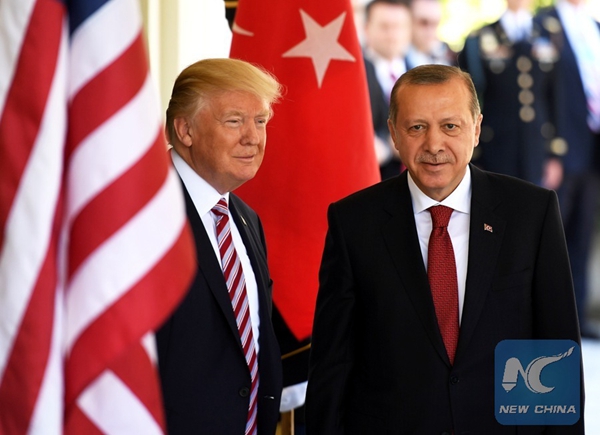Trump and Erdogan will cooperate despite differences
- By George N. Tzogopoulos
 0 Comment(s)
0 Comment(s) Print
Print E-mail China.org.cn, May 20, 2017
E-mail China.org.cn, May 20, 2017
|
|
|
U.S. President Donald Trump (L) welcomes Turkish President Recep Tayyip Erdogan at the White House in Washington D.C., the United States, on May 16, 2017. [Xinhua/Yin Bogu] |
Only a few days after his participation in the Belt and Road Forum for International Cooperation in Beijing, Turkish President Tayyip Erdogan headed to the White House to meet his U.S. counterpart Donald Trump. It was the first meeting between the two leaders at a difficult juncture for the bilateral relationship.
The American support for the Kurdish forces in Syria has angered Ankara. In particular, Washington decided at the beginning of May to arm the Syrian Kurdish People's Protection Units (YPG) in order to support an operation to retake the Syrian city of Raqqa from the Islamic State. For its part, Turkey considers YPG a terrorist organization associating it with the Kurdistan Workers Party (PKK) militant group.
In his public remarks with Trump in the White House, Erdogan was adamant in his position. "There is no place for the terrorist organizations in the future of our region. Taking YPG and PYD [The Kurdish Democratic Union Party] in the region - taking them into consideration in the region, it will never be accepted," he clarified.
Most international media report that the two presidents found no common ground. And some American think tanks frame this continuous disagreement as a clear signal that the U.S. administration prioritizes the war against the Islamic State and puts in second place the American-Turkish relationship.
Another issue of contradiction between the U.S. and Turkey is related to the potential extradition of Fethullah Gulen, a religious leader living in exile in Pennsylvania, whom Erdogan blames for the attempted coup last July. The Turkish president publicly referred to his "expectations [from the U.S.] with regard to the Fethullahist Terrorist Organization." Trump has not taken a straightforward position on the matter. Nevertheless, it seems that he will be hesitant to positively respond to Erdogan's request following the paradigm of his predecessor Barack Obama.
No doubt, American-Turkish relations are currently facing serious challenges and tensions are on the rise. This has not happened for the first time though. Bilateral relations have passed through various stages in the course of modern history.
Although the two countries are partners in the context of the North Atlantic Treaty Organization (NATO), they often tend to openly disagree. In 2003, for instance, Ankara rejected Washington's request to make use of its military bases in waging the Iraq war and removing Saddam Hussein from power.
Also, during the so called "Arab Spring" the American administration accused the Turkish government of indiscriminately arming fighters against Bashar al Assad in Syria and thus allegedly contributing to the rise of anti-Western extremists. Similar crises can be also found during the Cold War period. Following the Turkish invasion of Cyprus in 1974, for example, the U.S. imposed an arms embargo on Turkey, which was regarded by the latter as a slap in the face by a loyal ally.
Lessons from history suggest that the strategic dimension of the American-Turkish partnership has been respected by both sides over the years - irrespective of their provisionary disagreements. The policies of Trump and Erdogan will hardly constitute an exception in the coming years.
It is not a coincidence that they agreed to closely cooperate in the fight against terror despite their rift over YPG. The Turkish president also encouraged approximately forty international investors he met during his stay in the U.S. to intensify investments in his country and his U.S. counterpart confirmed "the need to reinvigorate trade and commercial ties."
As opposed to conventional wisdom, the two presidents have much more in common than discussed in the media discourse and are developing a good personal chemistry. Trump, for instance, congratulated Erdogan for his victory in the referendum of last month while Erdogan is expecting more from Trump than from Obama. More importantly, the new U.S. president is not objecting a Turkish mediation role in Syria while his predecessor was more skeptical. As Trump said in his public remarks: "We also appreciate Turkey's leadership in seeking an end to the horrific killing in Syria."
Furthermore, when communicating with Trump, Erdogan avoids the criticism Obama used to exert on him for his domestic policies vis-à-vis his political rivals and for his sweeping crackdown operations. His style of governance is not on the agenda of the new U.S. president. Obama was paying more attention to themes of human rights as a matter of principle. In his last visit to Europe in November 2016, for instance, he preferred to visit only Greece and not Turkey in a highly symbolical diplomatic gesture reflecting his personal frustration with the Turkish president.
Last but not least, the role of Russia could be important for the future evolution of the Turkish-American relationship. Obama had been suspicious on the rapprochement between Ankara and Moscow and on the general stance of the latter in world affairs, whereas Trump is positively disposed in spite of increasing domestic criticism. If the U.S. president escapes internal obstacles and implements his foreign policy agenda, then Turkey - in collaboration with Russia - will assume greater responsibilities in the Middle East.
George N. Tzogopoulos is a columnist with China.org.cn. For more information please visit:
http://www.china.org.cn/opinion/GeorgeNTzogopoulos.htm
Opinion articles reflect the views of their authors, not necessarily those of China.org.cn.







Go to Forum >>0 Comment(s)